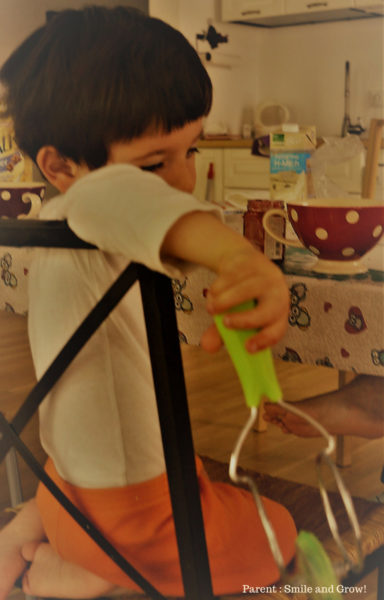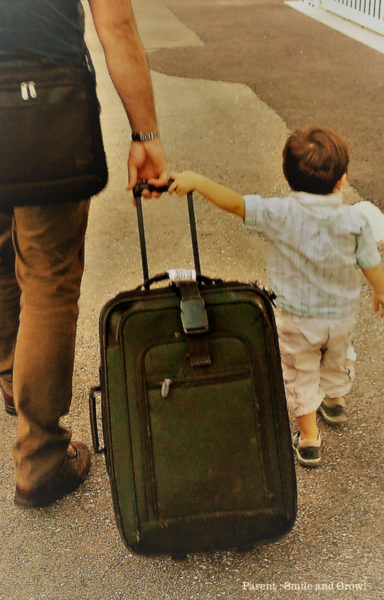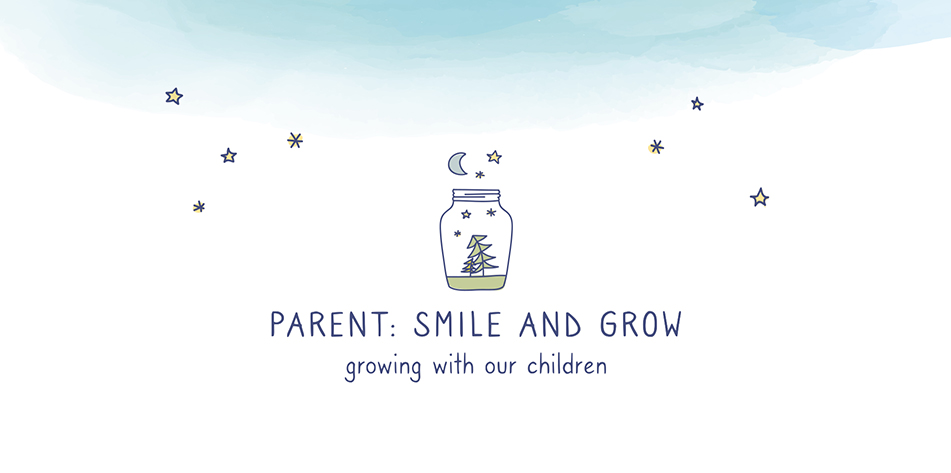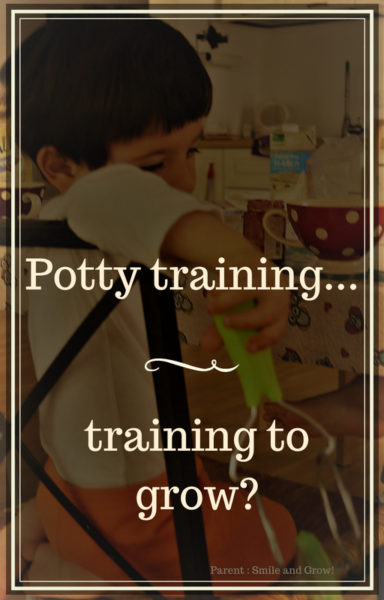Potty training, an adventure? If you find it overwhelming, if you’re wondering whether it’s the right moment to potty training your child.. this post will interest you! Potty training and similar adventures are fundamental steps in a child’s development. It’s when he/she starts to really grow independent.. Better to live the moment, stress-free!

Table of Contents
Potty training and similar adventures: too much theory?
Okay, let’s face it : there are way too many theories and strategies about potty training. The best age to do it; the things to avoid; when it’s too early when it’s too late.. I don’t want to add anything to that.
I’m just going to share my experience with my own kids, because I’ve just been through this right now. However easy it may seem, it does present a few frustrations and inconveniences.
Actually, the memory I had about my daughter’s potty training was making me postpone the training with my son. I was thinking .. well, let’s leave the diapers some more!
It ends up being practical : you don’t have to worry about having a toilet around you wherever you go; nor bringing clean underwear with you all the time, neither bicarbonate to wash the mattress several days in a row. (thank you Kristin for sharing this wonderful recipe to clean it from pee stains! Ok I know, it’s not glamorous.. But hey, it’s totally part of parenting joys..)
THE question : potty training, When?!
The physical rule I followed for both children, was to wait at least until they were able to go up and down the stairs by alternate foot by themselves. (It should indicate a sufficiently developed musculature so that they can control their bladder. you can take a better look here, and there, among the many websites out there.) .
With my daughter, the conditions were different and not optimal. At the time, she was 2 and a half; we had just moved into a new house and had our son in a matter of a few weeks. Moreover, she wasn’t yet able to talk much.
The problem was, she was very jealous, but couldn’t express it with words. We weren’t always able to understand her needs, physical but also in terms of attention or support.
The complete training lasted about 9 months, from the first times we regularly sat her on the potty, to when she was fully dry even at night.
It felt long to me, but I reckon that many of the “accidents” were due to a hidden request for attention.
One of the “funniest” thing was that, even a few months before starting to regularly use the potty, when she felt dirty she would just take her diaper off and let it drop on the floor, no matter where she was.
I even remember getting mad at that, trying to explain to her that she could not just leave her diaper anywhere and that she needed to call me..
I was trying to hold the balance while walking on that fine line between giving the rules that we feel important and sending the wrong message. Sometimes I would just fall on one of the sides, thus breaking this delicate balance.

Learning by doing ..
Our nursery school’s principal talked to us right at the beginning of the last school year about the “3-days technique” explaining that many parents in school use it and apparently works fine.
This technique was initiated in 2009 by a teacher in San Francisco, Julie Fellom, with her “Diaper Free Toddlers program“. This article describes it in detail.
I’m always skeptical when it comes to miracle tips & tricks, but a few of my son’s classmates, even the youngest, successfully went through it so I gave it a try. (my way!)
According to the explanations we were given at the time, this technique requires that during 3 days in a row, the child can go naked around the house, previously disseminated with potties in the strategic corners. Best option is, you shouldn’t leave the house during this trial period. Parents observe the child and gently remind him to use the potty whenever they see a sign of need.
Now, let’s say that I can get crazy if I don’t leave the house for 3 full days, especially on a prolonged, sunny and warm weekend. Let alone spend it running at my son and convince him to sit on the potty he hates.
.. and by adapting
Yes, the reason why I waited a little longer than I thought to insist with the potty is that my son refused to sit on it for months.
He started using it last summer, when he was merely 18 months old, and then, a few months later and out of the blue, categorically said no ever since. Like, crying desperately and screaming no. BUT I’d found out that not only he uses it in school, he even goes to the TOILET. This made me think that it was, in fact, the right moment to insist a little more.
This is how I adapted the technique to our own needs.. 😉
Potty training and similar adventures -Phase # 1
I had identified a long weekend (Monday was a holiday) without organized trips or events. A few weeks earlier, I began waking him up a little earlier every morning and forcing him to sit on the potty straight away.
It was a bit painful at first, I admit it. He cried a lot, I would cuddle him but keep him on the potty.. What he really wanted, was having his breakfast in peace. The diaper never bothered him – he could keep it dirty for hours, unfortunately.
Potty training and similar adventures –Phase # 2
We went buying his new underwear together. I let him choose the slips he wanted, and explained that on the following week, he would have to say bye to diapers and use his new underwear. We talked about it several times during this period, and tried to install a positive pride for himself during the process.
Potty training and similar adventures –Phase # 3
There it go, on that famous weekend! Potty in the middle of the living room and no diaper.
BUT we did our errands as usual. We saw friends, had dinner outside etc. I brought with me several changes, a towel to protect the car seat; I made sure to always show my son where the toilets were. We lived our regular life.
Potty training and similar adventures -Phase # 4
As I saw he was dry after nap, I asked him if he wanted to sleep without diaper. Sometimes he said yes, sometimes no; I didn’t force him on his choice.
During the day I did force him a little, as he felt sometimes nervous about it and embarrassed when accidents happened. Nonetheless, I tried to stay cool and calm and reassure him. And provided myself with easy solutions (express program on my washing machine!!).
For example, I told him episodes about all the accidents occurred to other children during potty training. When your sister was little, … My son is very sensitive and needs some gentle touch on such delicate matters, so he felt reassured of not being “wrong” in any way. I insisted a bit sometimes, as he would have liked to come back to the reassurance the diapers gave him.
Potty training and similar adventures – The inconveniences
My son wasn’t bothered at all by a wet diaper, so he did not have this incentive. He wasn’t even bothered by his eczema. He was upset about putting some cream on it, and I tried to play on this to motivate him. And it wasn’t enough.
Even the “you’re no longer a baby! do you want to be a baby?”-thing worked. On the contrary, he started out playing the baby, babbling instead of talking. He told me that he wanted to be a baby and have diapers. Gotcha.
Secondly, he was deeply embarrassed about accidents. He tries really hard when we are outside the house! When he’s in nursery school for instance he’s never had an accident. Even on the way to school, or if we go shopping or at the park, he’s extremely careful.
He asked me with a little voice : But what if I do it in my panties?
and when an accident did happen, I’m sorry mummy
while seeing me clean up.
I kept reassuring him, telling him that it’s normal when one’s learning; it is actually a way to learn, but he wasn’t always reassured. I’ve began thinking that maybe I should have started earlier on, when he didn’t have yet this shame or embarassement concept in his mind.
Small digression on embarrassment
I’ll do a little digression here to answer to this question. It’s come in my mind while I was writing.
Would it have been possible to potty training my child before he could feel embarrassment?
Embarrassment is an emotion that appears when we perceive another person’s attention on our-self. To be able to feel this emotion, the child needs to have acquired :
-
sense of self, of existing as a person, separate from mom
-
consciousness that other people do exist as a separate entity too. This entails having ideas and preferences, feeling emotions, that may differ from those of others.
-
empathy. The child learns to feel and abstract other people’s emotions.
All this happens approximately at 15-24 months. With that, the emergence of the so-called “self-conscious emotions”.
You can do an experiment.
Sit with your child, and put in front of you two plates. On one plate, something the child would never ever eat, like a nasty vegetable. On the other, something he loves, chips or crackers. Take a bite of the vegetable, with explicit signs of pleasure. Then take the cracker, and show signs of disgust. Make it clear with sentences like hum, this cabbage is so good, I love it!
and yuk, I hate crackers!
Make it realistic!
Now, hold your hand in front of the kid and ask Can you give me some?
without indicating what. When your kiddo has acquired the sense of self and of others, at around 18 months, he’ll give you the cabbage.(Poor you!)Before, he’ll give you the cracker. Simply, he cannot imagine that someone would be so crazy as to be wanting a piece of cabbage, when he could have a cracker instead! No wonder. He can’t perceive that others could have different tastes and desires. When he can, there it go with emotions such as embarrassment and shame.
This experiment was first presented by psychologists Dr.Betty Repacholi and Alison Gopnik, you can read something about it here .
Or, you can watch these videos :
Embarrassment and shame
Embarrassment resembles but is not equal to shame. The first is linked to the perception of somebody else’s attention on us. It can be a positive, such as a compliment, or a negative attention.
Shame, instead, is more complex. It depends on the evaluation of individual’s actions in regard to their standards, rules and goals and their global evaluation of the self.
(Lewis M. The Self-Conscious Emotions. In: Tremblay RE, Boivin M, Peters RDeV, eds. Lewis M, topic ed. Encyclopedia on Early Childhood Development [online]. http://www.child-encyclopedia.com/emotions/according-experts/self-conscious-emotions. Published September 2011.).
When my son was 15 months he could barely walk; before his 2 years he couldn’t possibly tell me anything about his physiological needs. We weren’t in any good condition to start with potty training BEFORE embarrassment.
If we listen to other experts, as Dr Steve J. Hodges, pediatrician urologist, potty training too early could cause damages (constipation, urinary infections, and so on). You can read his article here.
As I said, when dealing with children you end up with loads of equally discordant theories. I think it’s good to seek for information, but without getting extreme nor anxious. I chose it was better to support my child overcome his embarrassment.
How? No teasing. No extreme reactions. Let’s react in a positive way, with lots of cuddles and a good deep breath every so often. Here’s another useful reading. Enough with the theory for today!
Potty training – On the positive side
During the first week, we had approximately one accident per day, mostly in the evening at home. In a matter of two weeks, as he was dry after nap and in the morning.. And we took the diapers completely out of our life. It seems to me quite fast and effortless.
The fact that he can fluently talk and express himself has helped a lot. He understands all that I explain to him, and he tells me what he feels. Whether he’s nervous, afraid, angry.. We can talk about it. And that’s way better than trying to interpret single words or syllables or having him bite his classmates!
2 things we can keep in mind to support our child during potty training :
-
-
-
Our child will eventually be out of diapers one day. No need to feel the pressure about it, or make him or her feel “wrong” in any way.
-
Please, avoid shaming you child whatsoever. It can really harm, leading to anti-social behavior on the long run. If it’s really not working, it’s better to wait longer.
-
Mistakes are necessary for them to learn; we just need to think about solutions in any circumstance, and be cool about it.I used to sing Bob Marley in my head pretty often to help me with that 😉
Of course, no one’s happy about having to clean the floor or the clothes after a long day at work; nor to clean the mattress every few day. But, it’s not done on purpose to annoy us. It is a way to master this complex mechanism of “controlling our organs”.
The best way for us to keep calm is choosing the right moment. A moment in the year when we know we’ll be more available to face the collateral effects. So probably not when we have important social events such as a wedding or big ceremony! Not when there are major routine’s changes in the children’s life; neither when we are in a stressful period at work.
Yes, let’s keep your life as simple as possible! Which translates into : keep wet wipes and clean clothes with you at all times (that was a reminder to myself.) Mattress covers, fast programs on the washing machine..Finally, keep your smile on! There IS some fun in all this 🙂
Do you have any other suggestion or technique that worked great for you? Share it with us!
If your child has been diagnosed with autism spectrum disorder, I really recommend reading this “Ultimate Guide in Potty Training For Autism“. by the Autism Parenting Magazine. It can give you some useful insight!
-
-

